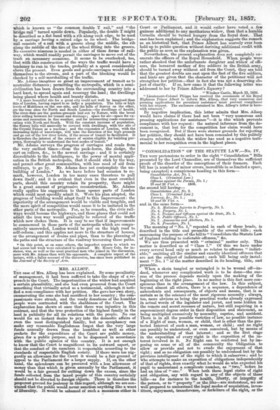MRS. A.LLSOP.
THE ease of Mrs. Allsop has been explained. By some peculiarity of management, it had been suffered to take the shape of a reproach to the Court. The importunities of the widow had acquired. a certain plausibility, and she had even procured from the Court something that virtually acted as a testimonial, although it notified a non-compliance with her petition. She gave her own story, enumerating the sons she had sacrificed to her country ; the compassionate were struck, and the ready donations of the humbler people were contrasted with the shabbiness of the Court. The explanation has shown at once that there was injustice in this contrast, and that the true protection of the highest family in the land is publicity for all its relations with the people. No one would for an instant desire to pry into the domestic affairs of even the most distinguished family, but no sycophancy can snake any reasonable Englishman forget that the very large funds annually drawn from the humblest as well as other pockets for the expenditure of the Court are public money, given for a public purpose, and to be dispensed in accordance with the public opinion of this country. It is not enough to know that the Court is magnificent in its outward aspect, or that the conduct of its members is respectable according to the standards of respectable English society. If there were too niggardly an allowance for the Court it would be a fair ground. of appeal to the Parliament for a larger supply. If, on the other hand, the splendours can be procured with a less allowance of money than that which is given annually by the Parliament, it would, be a fair ground for cutting down the excess, since the funds collected from the taxed people of this country certainly should not be diverted to foreign objects. There is therefore the properest ground. for jealousy in this regard, although we are convinced that the public would never sanction anything like a want of liberality. It would be ashamed of such a meanness either in
Court or Parliament, and it would rather have voted a few guineas additional to any meritorious widow, than that a humble Cornelia should be turned hungry from the Royal door. That ease has been explained; and the explanation suggests the remark as an historical fact, that Prince Albert has scarcely ever been held up to public question without deriving additional credit with the public as soon. as the explanation was given.
Nevertheless, the present explanation does not completely exonerate the officers of the Royal Household. When people were rather shocked that the unfortunate daughter and widow of officers, the bereaved mother of five soldiers in the British army, should be turned away without aid from the Court, they are told that the greatest doubts are cast upon the fact of the five soldiers, and hints are given that the character of the petitioner will not strengthen her petition—that in fact she was not a deserving object of charity. If so, how came it that the following letter was addressed to her by Prince Albert's Equerry ?
"Windsor Castle, March 23, 1856. "Lieutenant-Colonel Phipps has received the commands of his Royal Highness Prince Albert to inform Mrs. Allsop, that very numerous and pressing applications for pecuniary assist,ance must prevent compliance with her request. The enclosure contained in Mrs. Allsop's letter is herewith returned."
By negative implication, this letter admits that Mrs. Allsop would. have claims if there had not been "very numerous and pressing applications for assistance "—it is this which prevents compliance with her request: the natural inference from the document is, that but for the competition her claim would have been recognized. But if there were sterner grounds for rejecting her petition, they should not have been concealed by this politely evasive rebutter, which the widow has used as a negative testimonial to her recognition even in the highest places.


























 Previous page
Previous page